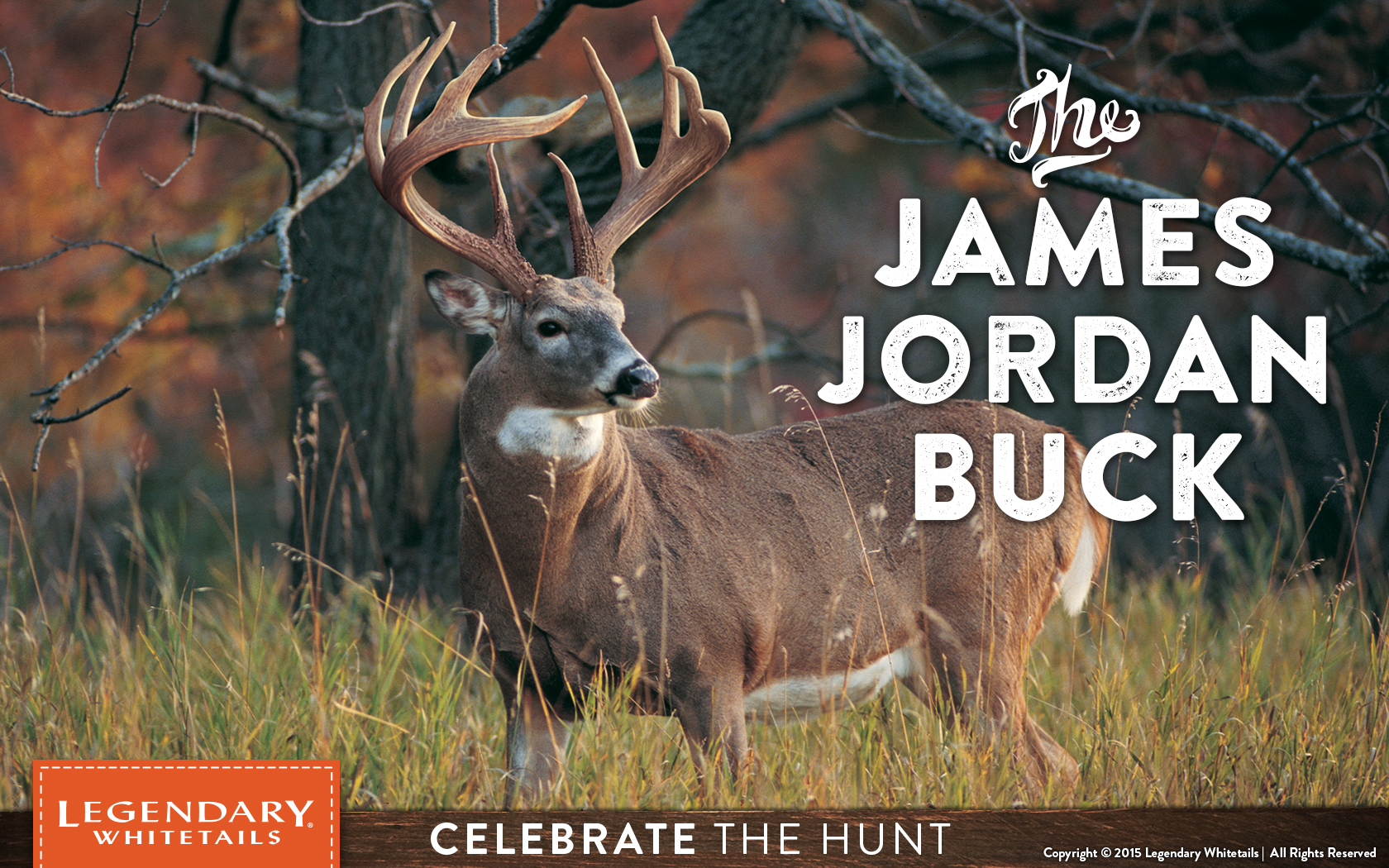For some reason, the stories of high-ranking whitetails often involve bizarre circumstances. The tale of James (Jim) Jordan’s amazing typical from Wisconsin is no exception. In fact, it could be argued that this is the strangest whitetail story of all.
Accounts of the hunt, as told by Jim before his death, have been printed in various publications, and these are apparently the only sources of factual information since all of the other participants and eyewitnesses have long since passed on. Based on these materials, what follows is the story of a chain of unlikely events that spanned 64 years and eventually led to the recognition of Jim’s massive 10-pointer as the world’s greatest typical whitetail.
It all began in the predawn on November 20, 1914, as Jim and friend Egus Davis readied their rented horse and wagon for a day of serious deer hunting. The new snow would make for good tracking, so expectations were high as the men bounced their way toward the Yellow River, where it snaked alongside the Soo Line Railroad just south of Danbury, Wisconsin.
Shortly after dawn, Egus bagged a fat doe. Winter meat was what he wanted, and this doe surely would be tastier than a tough, rutting buck. After borrowing Jim’s knife to field-dress the doe, Egus suggested they load her onto the wagon and head for the house. But, Jim was a diehard and decided to keep hunting alone.
After Egus had left, Jim quietly began walking toward the river, keeping a sharp eye out for deer and fresh sign. Soon, he came upon furrows in the snow where several whitetails had meandered past. As he leaned over for a closer look at the obviously fresh tracks, what really caught his eye was the enormous size of one of the sets of hoof prints. Jim knew that tracks don’t always indicate the size of a rack, but he couldn’t help visualizing a huge set of antlers belonging to the buck that had left those nearly elk-sized prints. He had to follow them.
Jim easily tracked the group in the new snow as they meandered alongside the railroad tracks. Then, as the hunter paused to listen to the familiar whistle of the train, the shrill scream caused four deer to come to their feet in the weeds just ahead of him. One of them was the biggest buck Jim had ever seen.
Instinctively, Jim shouldered his .25/20 Winchester and carefully aimed at the giant’s neck. The rack was frozen in place as the deer, unaware of the hunter’s presence listened to the sounds of the approaching train. Posed against the blue sky of a clear, cold day, the majestic buck with his heavy, golden-brown rack left an impression Jim would never forget. Finally, the hunter squeezed off the shot. Deer scattered at the sound, does in one direction and the buck in the other. Jim fired until his magazine was empty as the racing buck made for nearby cover.
Even though the buck hadn’t shown any visual signs of being hit, Jim felt certain he had connected with one or more shots. Now the hunter excitedly began following the long, leaping strides. But after going just a short distance, he realized his gun was empty. Only after a frantic search through all of his pockets did he discover a single remaining cartridge. This one would have to count!
Jim cautiously moved along the bounding tracks as they snaked through the thick brush toward the river. Finally, he saw what he had been looking for – blood. It wasn’t much, but it did verify he’d hit the buck. Eventually, the huge animal slowed. At first, he afforded Jim only an occasional glimpse, but after a while, the hunter got to where he could stay in constant visual contact. However, Jim was not yet close enough to be sure of a finishing shot. Stumbling, the buck finally made it to the river, at a point only a few hundred yards from Jim’s farm. It appeared he would stop, but suddenly, he jumped into the shallow river and made his way to the other side, surging through the light current.
By now, Jim had made his way to the river and was ready when the buck stepped from the water on the opposite bank. Still alert, the huge whitetail stared back across the river at his pursuer. Knowing his rifle was on the light side for such a big deer, Jim decided his best target would be the backbone. He took careful aim through the iron sights. At the crack of the rifle, the huge buck folded. Jim immediately waded into the icy water, keeping an anxious eye on his prize. Now, after several distant glimpses, he could get a close look at those magnificent antlers and the immense body. He wasn’t disappointed! The rack had 10 long, thick points and massive main beams, and the buck had a body to match. Estimates of the live weight were around 400 pounds.
Thinking he should field-dress the buck, Jim felt over the empty knife case and realized he had loaned the blade to Egus. It was cold, however, so it wouldn’t hurt to leave the buck ungutted while Jim hiked the quarter-mile back to the farm to get his knife.
He could hardly contain his excitement when he found Egus and told him the whole story. Anxiously, they made their way back to the river to retrieve Jim’s trophy – only to find the deer was gone! In a panic, they analyzed the situation and realized the buck must have given one last kick and slid into the river. Sure enough, at the first bend downriver, the big whitetail was found lodged on a rock in midstream. Once again, Jim waded through the frigid, waist-deep water to retrieve his prize.
Being a woodsman was a way of life for Jim. He’d fished, farmed, trapped and hunted as far back as he could remember. He was at home in the haunts of the whitetail and had taken many nice bucks. But, none was as large as this spectacular deer, so he decided to have the great trophy mounted.
One of the admirers who came to see the deer was a part-time taxidermist by the name of George VanCastle, who lived in the nearby town of Webster and worked on the Soo Railroad Line. Accepting an offer to mount the trophy for $5, Jim turned the unskinned head over to George, who left Danbury with it on the railroad, bound for Webster. As his buck left Danbury, little did Jim know that he wouldn’t see him again for more than 50 years!
As fate would have it, George’s wife became ill and died soon after he picked up the rack, prompting his decision to move to Hinckley, Minnesota. Several months later, Jim became concerned about the mount and traveled to Webster, only to discover that George had moved.
The air distance from Danbury to Hinckley was only 25 miles, but between the towns was a bridgeless stretch of the St. Croix River, making the trip difficult at best. For a variety of reasons, Jim postponed that trip to Hinckley until some time later, when a bridge finally had been constructed. Tragically, when Jim got to Hinckley, he learned that George had remarried, moved to Florida and presumably had taken the mounted head with him. In reality, the mounted buck had never left Hinckley; it was stored in the attic of George’s old house, where it continued to gather dust in obscurity. Even more ironically, Jim and his wife, Lena, moved to Hinckley several years after the deer was shot, where Jim operated a tavern on the east side of town. His mounted head was stored right there in the same small town for years, and he never knew it! It was just another quirk in a long string of bizarre events in this melodrama.
A lot of years passed before this enormous mount mysteriously showed up at a rummage sale in Sandstone, Minnesota, in 1958. According to Robert “Bob” Ludwig, a Department of Natural Resources forest technician from Sandstone, the antlers were then black with age, the mount was held together with old twine and sawdust leaked from various openings. However, Bob was impressed with the massive antlers and figured they were worth the asking price of $3, so he sprang for it.
After his purchase, the mounted head was moved between storage in his house and the barn, depending on the particular mood of Bob’s wife, who wasn’t really all that impressed with his great “deal.”
Then, in 1964, Bob read an article in an outdoor magazine that described the method used by the Boone and Crockett Club to measure whitetail racks. Bob rough measured his rummage sale special at a net score of 205 B & C points, which would make the massive 10-pointer a new world record!
Presuming he’d made a mistake, Bob mailed his completed score sheet to Bernie Fashingbauer, an official B & C scorer and a director of the Science Museum of Minnesota’s Lee and Rose Warner Nature Center. After a phone conversation, Bob was supposed to arrange a date for Bernie to score the trophy.
However, nearly a year went by with no action. But, then came another stroke of luck, this one good: While Bernie was on a hunting trip to the Sandstone area, he recognized Bob’s name on a mailbox and decided to stop in. He’d indeed found the right person after scoring the head tallied a potential world record score of 206 6/8 net points.
Then in 1971, the “Sandstone Buck,” as he’d been dubbed, was sent to Pennsylvania, where he was rescored by a B & C judges’ panel. The deer was indeed declared a new world record with a final net score of 206 1/8 points. But still, there remained the question of whether or not the deer had been shot, and if so, by whom. In yet another strange twist, sometime after the initial scoring in 1964, Bob had met his long-distant cousin – Jim Jordan! – to show off his incredible find. Immediately, Jim claimed this was the deer he’d shot way back in 1914!
Bob wasn’t convinced, however, because he’d always been under the impression that Jim’s rack had had a bullet hole in it. There was no hole in either of these antlers. Also, aside from Jim, there were no living witnesses who’d actually seen his deer. The debate continued for the next several years, as Jim tried to convince B & C officials and others that he’d indeed killed the buck a half-century prior. Meanwhile, in 1968, Dr. Charles Arnold purchased the rack from Bob for $1,500.
The question of whether the buck was from Minnesota or Wisconsin, and whether or not Jim was the hunter, endured for years. Finally, several persons, including Bernie Fashingbauer, Dr. Arnold and others brought forth enough evidence to convince a B & C committee to accept Jim Jordan as the hunter and Danbury, Wisconsin, as the location of the kill.
By now, more than a decade had passed since Jim had first seen his buck’s antlers again. During that interim, he’d gone to great lengths to convince people it was the same deer he’d shot so many years earlier, but he’d continued to run into dead ends. Among all of the persons who’d seen the animal back in 1914, only he was still living. Jim wasn’t interested in money; he merely wanted the recognition he felt was due to him for having shot such a trophy.
Finally, in December 1978, Jim was declared the “hunter” of the world record typical. But in the strangest and most tragic of all twists in this saga, the hunter never got to hear the name announced. Two months prior to this historic decision by B & C, Jim died at the age of 86. As you might expect of a deer that held the No. 1 position in the record book for almost a quarter-century (until Saskatchewan’s Hanson Buck beat him out,) the Jordan Buck is both huge and symmetrical. In fact, while the Hanson Buck is exceptionally well-balanced from one antler to the other, the Jordan Buck is even more so, with side-to-side differences of only 3 2/8 inches total.
The buck’s net score of 206 1/8 is a full 98.4 percent of his gross typical score, which is unmatched by any other whitetail in the upper tier of the record book. And, it shouldn’t be overlooked that this deer achieved his phenomenal score as a straight 5×5!
Perhaps the most unusual characteristic of the Wisconsin rack is that it’s so big and massive without having any abnormal points. This is the rarest of all traits in a truly world-class whitetail, for almost all of the great deer have at least one non-typical point. No matter where the Jordan Buck eventually ends up in the rankings, he’ll always be regarded as one of the most massive, perfect and, yes, legendary of all deer. Jim would certainly be proud.






